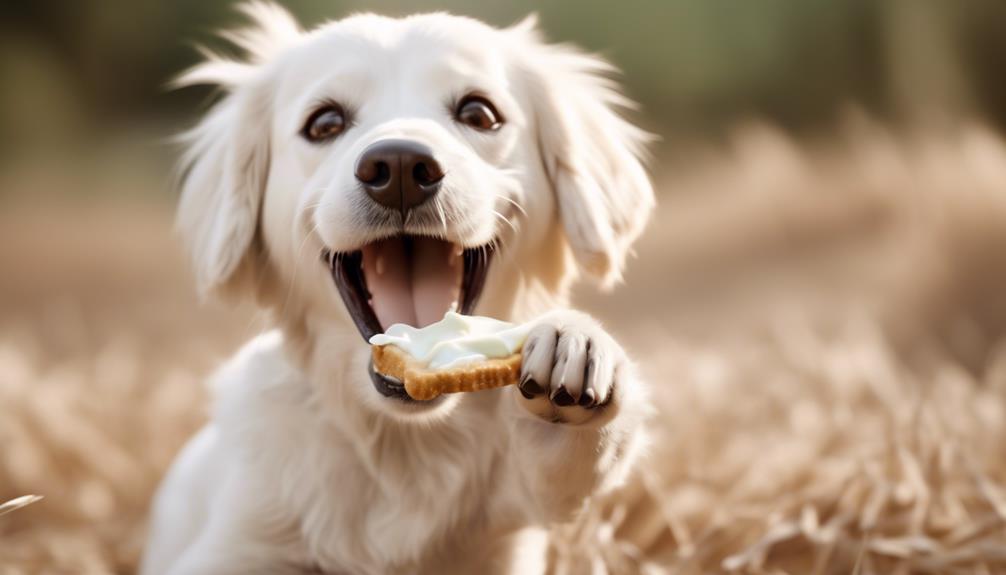7 Nutritional Tips to Combat Your Dog's Bad Breath
If you've ever been greeted by your dog's less-than-pleasant breath, you know the struggle. Despite regular dental care, some dogs continue to struggle with bad breath.
But before you rush to the vet for a professional cleaning, there are a few nutritional tips that could make a significant difference. With the right diet and some simple adjustments, you might just be able to solve the issue at home.
Importance of Dog's Diet
To maintain your dog's overall health and well-being, a balanced and nutritious diet is essential. This isn't only important for their physical health but also plays a crucial role in their dental hygiene.
Just like humans, dogs can suffer from dental issues such as bad breath, plaque, and gum disease. Ensuring that your dog's diet supports their dental hygiene is vital in preventing these problems.
A diet that promotes dental health should consist of foods that help control plaque and tartar buildup. Look for dog food that's specifically designed to promote dental hygiene, often formulated to help reduce plaque and tartar accumulation. Additionally, providing dental chews or toys can also aid in keeping your dog's teeth clean and healthy.
Furthermore, nutrient balance is key to your dog's overall well-being and can significantly impact their dental health. A well-balanced diet that includes essential nutrients such as vitamins, minerals, and antioxidants can support your dog's immune system and help combat oral health issues.
For instance, incorporating crunchy fruits and vegetables into their diet can help keep their teeth clean by removing food particles and stimulating the gums. Moreover, foods rich in omega-3 fatty acids can help reduce inflammation in the gums and support overall dental health.
Impact of Water Intake
Maintaining your dog's dental health through a well-balanced diet is essential. Now let's address the impact of water intake on their overall dental hygiene.
Hydration levels play a crucial role in your dog's oral health. Just like humans, dogs need an adequate intake of water to support their overall well-being, including their oral hygiene. Proper hydration helps to keep the gums moist, which is essential for preventing gum disease and other oral health issues.
When your dog is well-hydrated, their saliva production increases, aiding in the natural cleansing of the mouth and reducing the buildup of plaque and tartar.
In addition, water helps to wash away food particles and bacteria that can accumulate in your dog's mouth, contributing to bad breath. A well-hydrated dog is less likely to experience dry mouth, a condition that can lead to bacterial overgrowth and an increased risk of dental problems.
Encouraging your dog to drink an adequate amount of water throughout the day can significantly improve their oral health and combat bad breath.
To ensure that your dog stays properly hydrated, make sure that clean, fresh water is readily available at all times. Consider the size and breed of your dog when determining their water intake needs. Monitoring their water consumption and encouraging regular hydration will contribute to their overall dental health and help combat bad breath.
Beneficial Nutrients for Oral Health
Ensuring your dog receives essential nutrients such as vitamins and minerals is crucial for maintaining good oral health and preventing dental issues. Nutrient supplements play a vital role in supporting your dog's oral hygiene.
Vitamin C, for instance, is an essential nutrient that supports gum health. It helps in preventing periodontal disease and strengthens the gums. Additionally, Omega-3 fatty acids are beneficial for reducing inflammation in the mouth and supporting overall oral health. These can be found in fish oil supplements or added to your dog's diet through foods like salmon.
Minerals such as calcium and phosphorus are also essential for maintaining strong teeth and bones. They aid in preventing tooth decay and can be included in your dog's diet through nutrient-rich foods or supplements.
Probiotics are another important nutrient supplement that can positively impact your dog's oral health. These beneficial bacteria help in reducing harmful bacteria in the mouth, preventing plaque buildup, and promoting healthy teeth and gums.
Incorporating these nutrient supplements into your dog's diet can complement good oral hygiene practices and contribute to fresher breath and healthy teeth. However, it's important to consult with your veterinarian before introducing any new supplements to ensure they're appropriate for your dog's specific needs.
Together with regular dental check-ups and a well-balanced diet, nutrient supplements can significantly contribute to your dog's overall oral health.
Avoiding Foods That Contribute to Bad Breath
Considering your dog's oral health, it's essential to be mindful of the foods that can contribute to bad breath. Certain foods can exacerbate bad breath in dogs, so being aware of what to avoid can help maintain your furry friend's oral hygiene.
Here are some foods to steer clear of to combat your dog's bad breath:
- Sugary Treats: Foods high in sugar can feed the bacteria in your dog's mouth, leading to plaque buildup and foul odors. Limiting sugary treats can help prevent bad breath and maintain your dog's oral health.
- Dairy Products: While dairy can be a good source of calcium and protein for your dog, it can also lead to bad breath. Many dogs are lactose intolerant, and consuming dairy products can result in digestive issues and contribute to unpleasant breath.
- Fatty Foods: Greasy or fatty foods can leave residue in your dog's mouth, promoting bacterial growth and causing bad breath. Avoid feeding your dog excessive amounts of fatty meats or high-fat table scraps to help keep their breath fresh.
Incorporating Fresh Fruits and Vegetables

Incorporate fresh fruits and vegetables into your dog's diet to help combat bad breath and promote overall oral health. Healthy treats such as apple slices, carrots, and blueberries can be great options to freshen your dog's breath. These fruits and vegetables not only provide essential nutrients but also help with dental hygiene. The natural crunchiness of these treats can help remove plaque and tartar buildup, reducing the likelihood of dental issues that contribute to bad breath.
In addition to healthy treats, incorporating nutrient-rich meals with fruits and vegetables can significantly impact your dog's oral health. Consider adding fruits like watermelon or vegetables like green beans to your dog's regular meals. Not only do these foods contribute to better breath, but they also provide a range of vitamins, minerals, and antioxidants that support overall health. For example, the crunchiness of carrots can help clean your dog's teeth, while the vitamin C in fruits like strawberries and kiwi can help prevent periodontal disease.
When incorporating fresh fruits and vegetables into your dog's diet, it's essential to ensure that they're safe and appropriate for your pet. Some fruits and vegetables, such as grapes and onions, can be harmful to dogs, so always research before introducing new foods. By making mindful choices and incorporating a variety of fresh produce into your dog's diet, you can effectively combat bad breath and promote better oral health.
Consideration of Probiotics
To further improve your dog's oral health and combat bad breath, explore the potential benefits of incorporating probiotics into their diet to support a healthy digestive system. Probiotics are beneficial bacteria that offer a range of advantages for your dog's overall health, including their oral microbiome and digestive health. By incorporating probiotics into your dog's diet, you can potentially see an improvement in their breath as well.
Consider the following benefits of incorporating probiotics:
- Probiotic benefits: Probiotics can help maintain a healthy balance of beneficial bacteria in your dog's gut, which can positively impact their overall health, including their oral health. These beneficial bacteria can help combat the overgrowth of harmful bacteria that contribute to bad breath.
- Oral microbiome: Probiotics can play a crucial role in promoting a healthy oral microbiome for your dog. A balanced oral microbiome can contribute to fresher breath and overall oral health.
- Digestive health: Incorporating probiotics into your dog's diet can support their digestive health, which in turn can have a positive impact on their breath. A healthy digestive system can help reduce the likelihood of gastrointestinal issues that may contribute to bad breath.
Role of Dental Chews and Treats

Explore how dental chews and treats can contribute to maintaining your dog's oral health and combating bad breath.
Improving chewing habits is essential for your dog's dental health. Dental chews and treats are designed to encourage chewing, which helps in reducing plaque and tartar buildup on your dog's teeth. These products are formulated to promote dental health by incorporating ingredients that help control bad breath and support oral hygiene. By giving your dog dental care products like chews and treats, you can actively participate in their oral hygiene practice.
Dental chews and treats play a significant role in your dog's dental health. They aren't only a tasty reward for your furry friend, but they also serve as a tool for maintaining oral hygiene. These products are made to be appealing to your dog, making it easier for you to integrate them into their daily routine. By incorporating dental chews and treats into your dog's diet, you're creating a proactive approach to combat bad breath and promote dental health.
When considering dental care products for your dog, it's important to choose those that are recommended by veterinarians and proven to be effective. Look for dental chews and treats that are specifically designed to improve your dog's chewing habits and contribute to their overall dental health. With the right dental care products, you can actively support your dog's oral hygiene and ensure their breath stays fresh.
Homemade Breath-Freshening Recipes
You can easily help freshen your dog's breath with simple homemade recipes using natural ingredients commonly found in your kitchen. These recipes aren't only effective but also easy to prepare, making them a convenient and affordable option for improving your dog's oral hygiene.
Here are a few homemade breath-freshening recipes to try:
- Coconut Oil and Cinnamon Blend: Mix a teaspoon of coconut oil with a pinch of cinnamon. The lauric acid in coconut oil has antibacterial properties, while cinnamon helps combat bad breath. Simply add a small amount to your dog's food or allow them to lick it off a spoon.
- Parsley and Mint Infused Water: Create a herbal infusion by steeping fresh parsley and mint in hot water. Once the water cools, strain out the herbs and use the infused water as a breath-freshening mouth rinse for your dog. Both parsley and mint contain natural deodorizing properties.
- Apple Cider Vinegar Spray: Dilute apple cider vinegar with water in a 1:2 ratio and pour the mixture into a spray bottle. Lightly spritz your dog's water or food with this solution. Apple cider vinegar helps balance the pH levels in your dog's mouth, creating an environment less conducive to odor-causing bacteria.
These recipes utilize natural ingredients and require minimal preparation, offering a safe and effective way to combat your dog's bad breath.
Frequently Asked Questions
What Are Some Common Underlying Health Issues That Can Cause Bad Breath in Dogs?
Common underlying health issues that can cause bad breath in dogs include dental problems, such as plaque buildup and gum disease. Other issues may involve gastrointestinal problems, metabolic diseases, or respiratory issues.
It's important to address these issues through diet management and oral hygiene, as well as regular check-ups and professional cleanings by a veterinarian.
Proper care and attention to your dog's overall health can help combat bad breath and prevent more serious health problems.
Can Certain Medications or Supplements Contribute to Bad Breath in Dogs?
Certain medications or supplements can contribute to bad breath in dogs. It's important to consider dietary considerations and how medication impact oral hygiene.
Be sure to schedule regular dental checkups to address any potential issues. Keep an eye on your dog's breath and consult with your vet if you notice any changes while they're on medication or supplements.
Good oral care is crucial for your dog's overall health and well-being.
Are There Any Specific Dental Care Products or Tools That Can Help Improve My Dog's Breath?
To improve your dog's breath, consider using dental chews and water additives. Regular check-ups and professional cleanings are essential for maintaining good oral health. These tools and products can help reduce plaque and tartar buildup, which are common causes of bad breath in dogs.
Additionally, they can promote healthy gums and freshen your dog's breath. Remember to consult your veterinarian for recommendations tailored to your dog's specific needs.
How Often Should I Brush My Dog's Teeth to Help Combat Bad Breath?
To maintain your dog's oral health, proper brushing is key. The frequency recommendations for brushing your dog's teeth typically range from 2-3 times per week. However, some vets may suggest daily brushing for dogs with specific dental issues.
Regular brushing can help combat bad breath, prevent plaque buildup, and reduce the risk of dental diseases. Always use a dog-specific toothbrush and toothpaste to ensure their safety and effectiveness.
Are There Any Alternative Remedies or Natural Solutions for Addressing Bad Breath in Dogs?
To address bad breath in dogs, you can consider natural remedies like essential oils and maintaining oral hygiene.
Additionally, a raw food diet can also help combat bad breath in dogs.
These approaches can be effective in keeping your dog's breath fresh and promoting overall oral health.
However, it's important to consult with a veterinarian before introducing any new remedies or dietary changes to ensure they're safe and appropriate for your dog.
Conclusion
So, next time you notice your dog's breath getting a bit stinky, remember these 7 nutritional tips to combat bad breath.
By paying attention to your dog's diet, water intake, and oral health, and by avoiding certain foods, incorporating fresh fruits and vegetables, considering probiotics, and using dental chews and treats, you can help keep your furry friend's breath fresh and their overall health in check.
